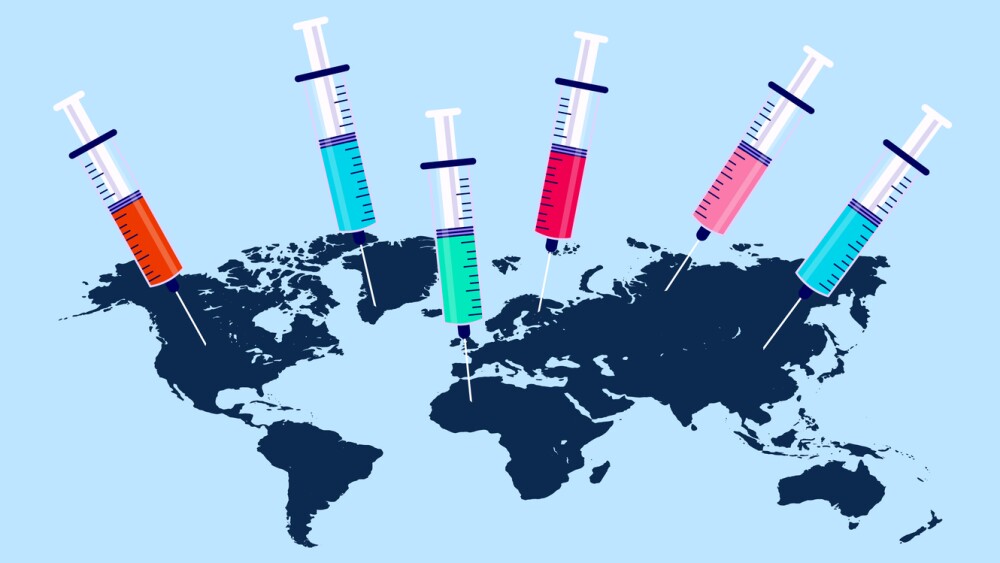A judge in the U.K. last month sided with Pfizer over GSK in a respiratory syncytial virus vaccine patent lawsuit, positioning both companies to compete for that market and laying down a marker for ongoing legal clashes in other parts of the world.
Competition for control of the emerging blockbuster respiratory syncytial virus vaccine market has played out in parallel to court cases about whether Moderna and Pfizer are infringing GSK’s patents. After a delay, the first ruling in October has dented GSK’s prospects of preventing Pfizer from mounting a challenge for the market.
The case centered on two patents that describe strategies for creating a recombinant respiratory syncytial virus (RSV) antigen by stabilizing it in a prefusion conformation. Pfizer filed the case in June 2022, arguing that enforcement of three patents should be invalid because they were causing “commercial uncertainty.” Anaelle Tannen, an infectious disease analyst at GlobalData, outlined the implications of a ruling that removes the uncertainty.
“No changes can be expected within the RSV vaccine market in the U.K.,” Tannen said. “Whilst GSK is unhappy with the High Court’s decision and plans to appeal it, it is unlikely that the verdict will change within the U.K. and thus Pfizer’s Abrysvo and GSK’s Arexvy will continue to be marketed as usual.”
One of the patents was revoked before the judge ruled on the case. Pfizer claimed the remaining two patents are invalid because the stabilization techniques they describe would be well known to experts in the field. The company pointed to the use of similar approaches in other therapeutic areas, such as HIV, to make its case.
In response, GSK said a skilled team would need to take six steps to arrive at the invention. Pfizer’s ability to persuade the judge that the invention was obvious rested, in part, on its successful argument that the skilled team should include a vaccinologist and a structural biologist. The judge sided with Pfizer on that point and on the key conclusion that the two patents are invalid due to obviousness.
The ruling clears a potential barrier to Pfizer selling its RSV vaccine in the U.K. According to the judge, GSK intended to seek an injunction to restrain Pfizer’s use of its product in older adults. GSK would not seek an injunction in the maternal indication, where its vaccine is not approved, if Pfizer submitted to a “commercially acceptable” license, the judge said.
An injunction on the sale of Abrysvo in the U.K. would have prevented Pfizer from capitalizing on an area where it has an advantage over GSK, the early frontrunner in the RSV vaccine space. The U.K. selected Pfizer over GSK as its initial RSV vaccine supplier, positioning it to buy 4.9 million doses of Abrysvo over the next two years. Vaccines for older adults account for 3.5 million of the ordered doses.
The Global Implications
The U.K. legal ruling is part of a global battle between the two companies. GSK filed a complaint against Pfizer in the U.S. in August 2023, alleging that the active ingredient in Abrysvo infringes four U.S. patents. GSK is seeking monetary damages and a permanent injunction against sales of Abrysvo for use in adults over 60 years of age. GSK added two more patents to the complaint in November 2023.
In parallel, Pfizer has challenged certain GSK patents outside the U.S. The U.K. is one of the places where Pfizer has disputed the GSK patents. Similar legal cases are underway in Belgium and the Netherlands. Tannen said the U.K. ruling “will surely impact ongoing legal cases” in other countries and set out what that could mean for the global RSV vaccine market.
“GSK’s claim of patent infringement on similar grounds in the U.S. could face a tougher challenge now that a major court has invalidated the patents. Pfizer’s grounds that GSK’s patents are obvious may gain traction in other courts, undermining GSK’s legal strategy,” Tannen said. “It is unlikely that GSK will win the legal battle and thus the global RSV vaccine market will not be affected.”
Even if GSK’s legal challenge against Pfizer fails, the company’s lawyers could still have an impact on the RSV vaccine market. GSK opened another front in the patent fight in October 2024 when it sued Moderna. The case against Moderna in RSV, which GSK filed alongside a related lawsuit focused on COVID-19, relates to five patents that cover mRNA technology.
The lawsuit claims that “Moderna stands to profit significantly and negatively impact GSK sales of Arexvy through continued infringement of GSK Biologicals’s Patents-in-Suit without taking a license.” According to the lawsuit, GSK sent an infringement notice to Moderna in October 2024. Since then, GSK claims that Moderna has “knowingly” induced third-party manufacturers and healthcare practitioners to infringe its patents by producing and administering the biotech’s RSV vaccine mRESVIA.
There are signs GSK, Moderna and Pfizer are competing for a market that may fail to live up to early forecasts. Analysts initially predicted the global market could be worth more than $10 billion by 2030. However, Airfinity cut its 2030 forecast for the U.S. market from $4.7 billion to $1.7 billion in response to updated vaccination recommendations and Jefferies analysts recently noted “slow” uptake in the U.S.
As the Q3 2024 earnings season confirmed, the U.S. RSV vaccine market is under pressure—for some companies more than others. While sales of Pfizer’s Abrysvo fell 5% in the quarter, GSK reported a 73% year-over-year plunge in Arexvy sales. GSK lowered 2024 guidance to now be low single-digit decline vs low-mid-single-digit growth, according to Jefferies analyst Michael Yee.
In a Nov. 8 note to investors, Yee warned that GSK and Pfizer “commentary on Q3 suggests limited changes to the vaccine recommendations outlook in 2025 suggesting an additional second dose might not be recommended next year.”






